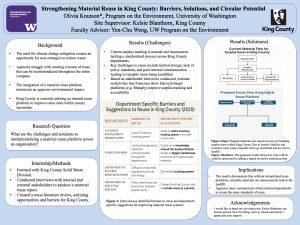Strengthening Material Reuse in King County: Barriers, Solutions, and Circular Potential
Most current processes for tracking and redistributing surplus items across departments are flawed and inefficient. As King County works to meet climate action goals, material reuse presents a critical yet underutilized opportunity to reduce waste, conserve resources, and minimize greenhouse gas emissions. The aim of this internship was to evaluate the feasibility and benefits of implementing an internal material reuse platform to support circular economy goals within King County operations. This internship involved a qualitative research approach, including stakeholder interviews with employees across five King County departments, literature review on reuse platforms, and case studies of reuse programs in San Francisco and San Antonio. The data was analyzed to identify system gaps, user challenges, and potential solutions for platform implementation. Key findings revealed that King County faces major barriers including lack of inventory tracking excess materials, limited storage space, and policy constraints. However, case studies demonstrate that digital platforms can increase reuse, improve communication, and reduce emissions if supported with infrastructure and policy change. This work supports the development of a centralized material reuse system in government organizations, recommending platform adoption, increased warehouse capacity, and formal reuse mandates. If implemented, these changes could foster institutional circularity, reduce operational costs, and help the County meet sustainability targets outlined in the 2025 Strategic Climate Action Plan.
